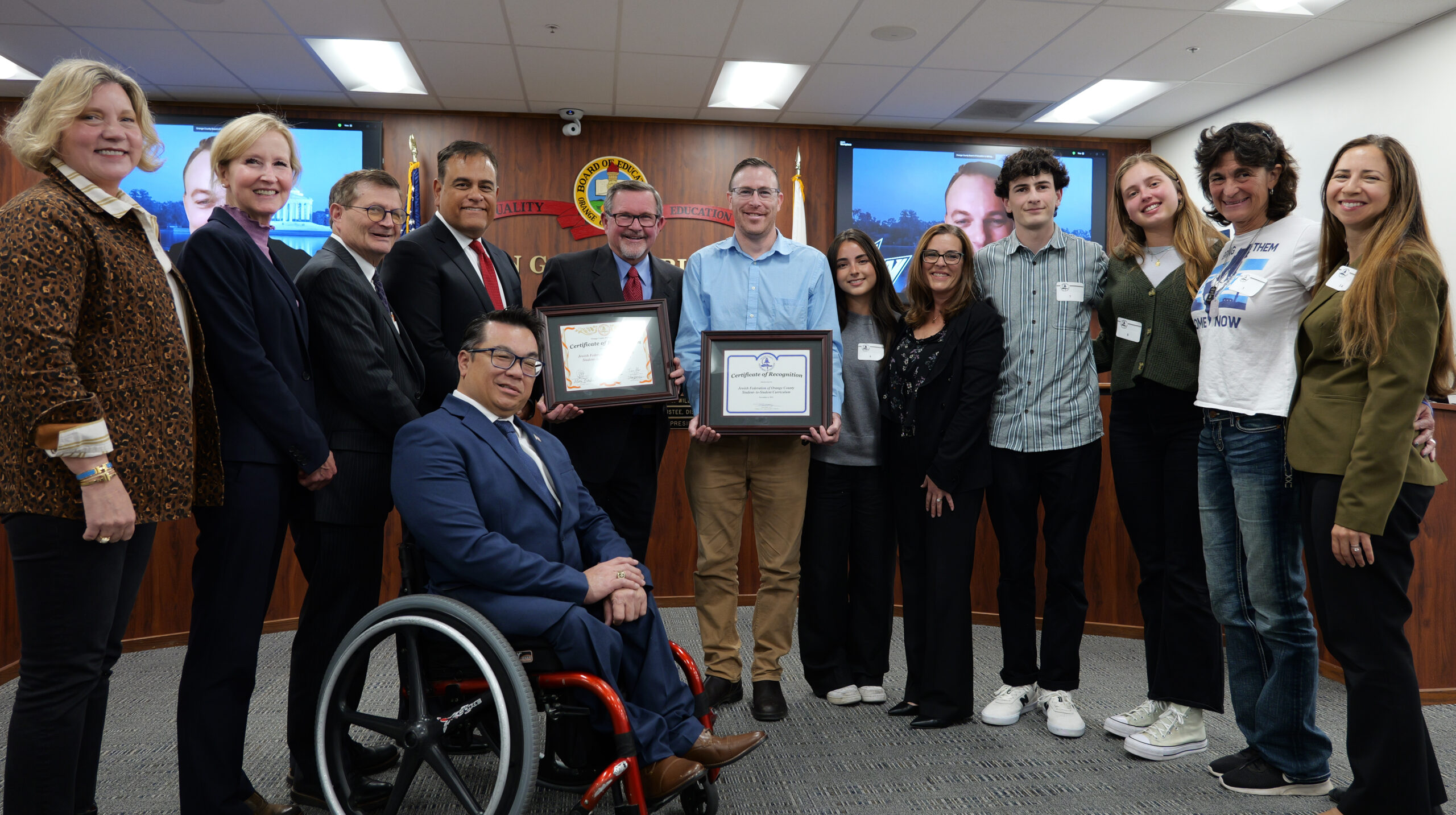
Seeking to bridge cultural divides, Jewish high schoolers across Orange County are stepping into classrooms to share personal stories and insights about their faith and traditions.
The Jewish Federation of Orange County created the Student to Student program to offer public and private school audiences a firsthand look at Jewish life, history and values. By sharing their experiences directly with peers, student ambassadors hope to counteract antisemitism, foster empathy and promote greater respect for religious diversity.
During Wednesday night’s Orange County Board of Education meeting, Student to Student Coordinator Robin Steinmetz noted that antisemitism has risen alarmingly in recent years, both locally and globally, with incidents estimated to have increased by 400 percent since last year’s attack on Israel.
“So now is a critical time to lean in,” she said, “and Student to Student is a positive educational program that can be used both proactively and, when needed, reactively, and it also helps to encourage a positive campus climate.”
Following a 10-minute presentation by Steinmetz, two student ambassadors shared their thoughts on dismantling biases and engaging peers in meaningful discussions about culture and identity. County trustees and Orange County Superintendent Dr. Stefan Bean presented special certificates to recognize program leaders after expressing their gratitude.
“Visiting a concentration camp makes you a different person, when you’re going through it and when you leave,” Orange County Board of Education President Dr. Ken Williams said. “I went to Dachau when I was 18, a very impressionable young year, and I still remember the vivid pictures and what it was like to be in Dachau and what happened in Dachau.”
“I want to thank you for coming here and putting this together,” he added.
A deeper understanding
The Student to Student program was established four years ago as part of the federation’s Rose Project. Working in small teams, high school ambassadors visit campuses to talk about their lives, beliefs and traditions, encouraging a deeper understanding of Judaism that goes beyond textbooks and history lessons. Topics include the Jewish diaspora, milestone traditions, the significance of Israel, the Hebrew language, antisemitism and the Holocaust.
Presentations can range from 40 to 80 minutes or more and are crafted to align with state curriculum guidelines for grades six through 12. As such, they can be integrated into lessons on ancient civilizations, U.S. and world history, literature and geography. In courses like ethnic studies and comparative religions, Jewish culture and beliefs are brought to life through firsthand stories and open dialogue.
Using props such as challah bread and Shabbat candles, the students strive to make presentations interactive and engaging, creating an atmosphere where their peers feel comfortable asking questions about unfamiliar customs.
“I can see in their faces when I speak to them, I can see that I’m reaching them,” said Nathan, a junior in the Newport-Mesa Unified School District. “Or I can see that, maybe I’ll say something important about how something happened to my family, and you’ll see them perk up, because they realize this isn’t just a story — it’s real life.”
Peer-to-peer model
Now in its fourth year, the Student to Student program reached over 4,000 students, teachers and administrators across Orange County during the 2023-24 school year, according to Steinmetz. Altogether, 54 ambassadors delivered 79 presentations to 19 schools, funded by private donations, and the feedback has been extremely positive.
“I am so very grateful to have been given this opportunity as a student here at my school,” one Garden Grove 10th-grader said. “This presentation helped my understanding of the Jewish people and Judaism, and now I feel much more aware of those around me.”
Surveyed teachers report that the presentations, available at no cost, have a lasting impact, with 94 percent noting that students continue discussing what they learned in later classes. Steinmetz added that 100 percent of teachers surveyed said they would invite the program back to their classrooms.
“The big impression is that students love learning from other students,” she said. “So instead of a teacher or an adult in the room, students are sharing and teaching. I think that peer-to-peer model is amazing, and I think it allows them to hear something that they wouldn’t normally hear and adds another dimension to their education.”
For more information, visit the Jewish Federation of Orange County’s website or contact Robin Steinmetz at rsteinmetz@jfedoc.org or 949-227-4963.
